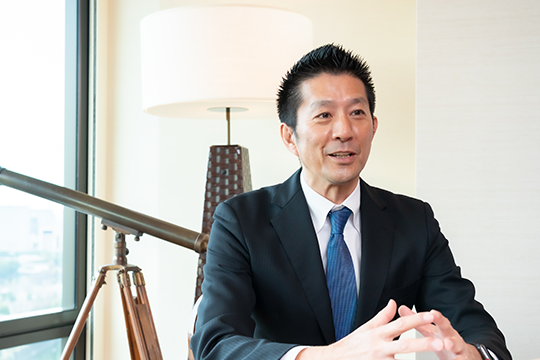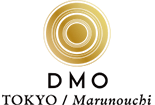SUSTAINABILITY
Interview
Striving to balance luxury and sustainability
Acquiring the first EarthCheck Certification in Japan
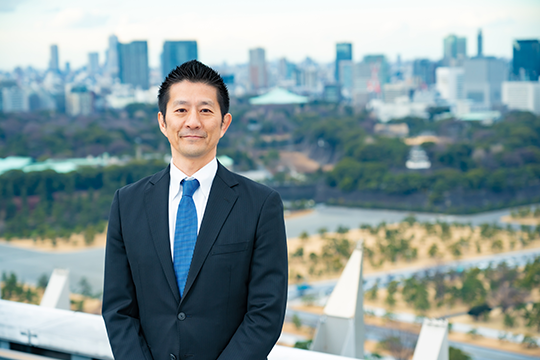
Junjiro Yamashita
The Peninsula Tokyo
Director of Corporate Affairs
The Peninsula Tokyo
Director of Corporate Affairs
The Peninsula Hotels has designated sustainable luxury as the CSR theme and The Peninsula Tokyo, the hotel in Japan, has continued to work toward sustainable hotel operations since opening in 2007. It was the first in Japan’s tourism industry to acquire Gold Certification from EarthCheck, an environmental management certification group. We spoke with Junjiro Yamashita, Director of Corporate Affairs, about various progressive initiatives.
Existing in harmony with society and the environment in accordance with the times
――
The Peninsula Group has named sustainable luxury as its CSR theme. Please tell us about what led to this and the Group's approach.
Yamashita
First, it's premised on the fact that our Group has always focused on the long term when it comes to business. Our parent company, The Hongkong and Shanghai Hotels, Limited is a company owned by the Kadoorie family. That approach has been very evident since its founding in 1866 as the business has been passed down through generations of the family. For instance, when our company expanded in Japan it took more than 20 years to secure the ideal location. Today, we have 10 hotels around the world, but the Group intends to carry out business for many years, perhaps 100 or 200. Accomplishing this necessitates existing in harmony with society and the environment in accordance with the times.
In 2007, our company established a CSR committee, and from 2014 the Group as a whole launched "Sustainable Luxury Vision 2020," which names over 50 economic, societal, and environmental goals. I think our level of commitment becomes apparent as the hotel managers in all our hotels are responsible for implementing this vision. Striking a balance between luxury and sustainability may initially seem difficult, but through our endeavors we’ve gained the conviction that it's achievable.
In 2007, our company established a CSR committee, and from 2014 the Group as a whole launched "Sustainable Luxury Vision 2020," which names over 50 economic, societal, and environmental goals. I think our level of commitment becomes apparent as the hotel managers in all our hotels are responsible for implementing this vision. Striking a balance between luxury and sustainability may initially seem difficult, but through our endeavors we’ve gained the conviction that it's achievable.
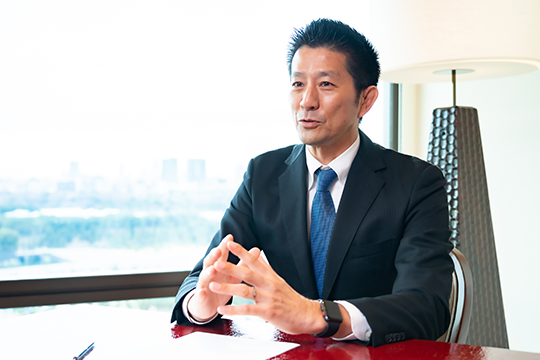
Acquiring the EarthCheck Gold Certification
――
In 2020, you obtained Gold Certification from the EarthCheck* environmental management certification group. This followed Bronze Certification in 2014 and Silver Certification in 2015, all of which were firsts in Japan.
Yamashita
As a policy aimed at sustainable luxury, our Group has embraced EarthCheck Certification, which is considered a global standard in the tourism industry. Given that we were the first to do so in Japan, there were no other company models in the country that we could refer to, and fulfilling our goal of acquisition was an ongoing process of trial and error. First, the facilities management division played a central role in rendering all numerical values in our hotel operations visible. In addition, we specified action plans in ten areas, such as greenhouse gas emissions, energy efficiency, and energy conservation, and implemented them throughout the company.
We switched indoor building lighting to LED not only in the back offices, but also in some places visible to our guests. We also treat kitchen drainage so it can be reused as water in employee toilets, and transform food waste into compost. We installed chemical treatment equipment in all cooling towers to reduce the frequency of replacing coolant, made adjustments to minimize the flow rate from all faucets, and achieved improvements in water conservation and water quality through steady, resourceful actions. Compared to 10 years ago, we have achieved 454t (24%) of water conservation annually, despite the operation rate increasing 18%. The facilities management team has done quite well by asking how we can improve numerical values without impacting guests.
We had already made some progress in reducing electricity consumption because of the electricity crunch caused by the 2011 Great East Japan Earthquake, and that boosted our efforts to obtain certification. Based on the slogan, "Save Energy for Japan," we switched the summer staff attire to polo shirts and limited use of air conditioning in the back offices, resulting in a significant power-saving outcome. At the time, we received some negative opinions about staff wearing polo shirts in luxury hotels, but we continued our efforts while communicating the motivation for our activities, and in the end a new accepted practice at The Peninsula took root.
(Currently, the polo shirt initiative is not being carried out.)
We switched indoor building lighting to LED not only in the back offices, but also in some places visible to our guests. We also treat kitchen drainage so it can be reused as water in employee toilets, and transform food waste into compost. We installed chemical treatment equipment in all cooling towers to reduce the frequency of replacing coolant, made adjustments to minimize the flow rate from all faucets, and achieved improvements in water conservation and water quality through steady, resourceful actions. Compared to 10 years ago, we have achieved 454t (24%) of water conservation annually, despite the operation rate increasing 18%. The facilities management team has done quite well by asking how we can improve numerical values without impacting guests.
We had already made some progress in reducing electricity consumption because of the electricity crunch caused by the 2011 Great East Japan Earthquake, and that boosted our efforts to obtain certification. Based on the slogan, "Save Energy for Japan," we switched the summer staff attire to polo shirts and limited use of air conditioning in the back offices, resulting in a significant power-saving outcome. At the time, we received some negative opinions about staff wearing polo shirts in luxury hotels, but we continued our efforts while communicating the motivation for our activities, and in the end a new accepted practice at The Peninsula took root.
(Currently, the polo shirt initiative is not being carried out.)
*
EarthCheck is a specialized group founded in Australia in 1987 that certifies the sustainability of communities and companies in the tourism industry. The key program, EarthCheck Certified establishes a 3-level standard (gold, silver, bronze) according to the number of years initiatives have been implemented. Currently, it has been adopted in over 70 countries.

Cool towers installed on the rooftop
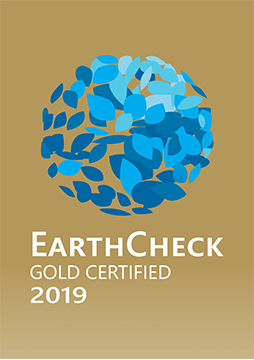
The EarthCheck Gold Certification
Ending shark fin cuisine to protect the ocean's ecosystem
――
One other unique initiative was putting an end to offering cuisine made with shark fin in 2012. Please tell us about what was behind that decision.
Yamashita
The decision to stop offering shark fin was a Group-wide one. The aim was to end overfishing of sharks and protect the ocean's ecosystem. The Peninsula Hotels originated in Hong Kong, the home of Cantonese cuisine, and shark fin is an ingredient essential to celebrations and happy events. Naturally, we heard some harsh words from guests. In actuality, use for business entertainment at one point considerably decreased. I think at first on-site staff were also a little perplexed.
We were the first luxury hotel to stop serving shark fin. Now, when SDGs have become widespread, I think we would gain a certain amount of understanding if we were to say it's to contribute to Goal 14 "Life Below Water," but at the time that wasn't the case. The general response was, "You're no longer serving shark fin? But it's so popular. Why?" However, our Group believed that as the hotel group with the longest history in Asia, our behavior carries weight and there were sure to be other facilities that would agree and follow our lead, so we forged ahead with strong conviction.
Shark fin is an easy-to-understand example, but it isn't a special case from the point of sustainable procurement. The hotel purchasing department has determined procurement guidelines that include human rights in addition to preserving the ecosystem and environmental conservation, and is purchasing supplies only from clients who agree to those guidelines.
We were the first luxury hotel to stop serving shark fin. Now, when SDGs have become widespread, I think we would gain a certain amount of understanding if we were to say it's to contribute to Goal 14 "Life Below Water," but at the time that wasn't the case. The general response was, "You're no longer serving shark fin? But it's so popular. Why?" However, our Group believed that as the hotel group with the longest history in Asia, our behavior carries weight and there were sure to be other facilities that would agree and follow our lead, so we forged ahead with strong conviction.
Shark fin is an easy-to-understand example, but it isn't a special case from the point of sustainable procurement. The hotel purchasing department has determined procurement guidelines that include human rights in addition to preserving the ecosystem and environmental conservation, and is purchasing supplies only from clients who agree to those guidelines.
A food donation program involving guests
――
In 2021, you will celebrate 15 years since opening. What activities do you value when it comes to working with the community?
Yamashita
One program is "The Peninsula Academy" that lets our guests experience local culture and history. It's offered at all The Peninsula Hotels in 10 cities worldwide, but the program content completely differs to reflect the characteristics of each location. At The Peninsula Tokyo, a very popular program is the walking food tour that introduces the Yurakucho underpass area, which is crowded with distinctive establishments. A tour guide thoroughly explains Japanese culture and even table manners, so overseas guests can also enjoy this experience that encompasses more than food.
In addition, in 2020 we undertook a project at all 10 hotels called "We Meet Again." It incorporates our joy at being able to serve everyone again after voluntarily restricting operations due to COVID-19 and our feelings of gratitude toward the local community. We combined a food donation program and "The Eight Loves of The Peninsula Tokyo," an accommodation plan that includes a variety of perks.
The food donation gifts one meal for each meal a guest eats at a restaurant under our direct management. Through our charity partners, Second Harvest Japan and Hands On Tokyo, we provided boxed meals to various facilities needing food. In addition to many employees helping in the kitchen, guests who chose the social contribution program from the 8 hands-on programs offered through "The Eight Loves of The Peninsula Tokyo" also helped through actions such as wrapping boxed meals. It was a new endeavor, but it was popular as firsthand volunteer experience that is difficult to get, and the response was favorable.
In addition, in 2020 we undertook a project at all 10 hotels called "We Meet Again." It incorporates our joy at being able to serve everyone again after voluntarily restricting operations due to COVID-19 and our feelings of gratitude toward the local community. We combined a food donation program and "The Eight Loves of The Peninsula Tokyo," an accommodation plan that includes a variety of perks.
The food donation gifts one meal for each meal a guest eats at a restaurant under our direct management. Through our charity partners, Second Harvest Japan and Hands On Tokyo, we provided boxed meals to various facilities needing food. In addition to many employees helping in the kitchen, guests who chose the social contribution program from the 8 hands-on programs offered through "The Eight Loves of The Peninsula Tokyo" also helped through actions such as wrapping boxed meals. It was a new endeavor, but it was popular as firsthand volunteer experience that is difficult to get, and the response was favorable.
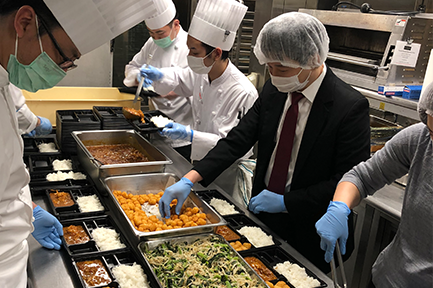
Many employees helping in the kitchen for the food donation program
Photo provided by The Peninsula Tokyo
Photo provided by The Peninsula Tokyo
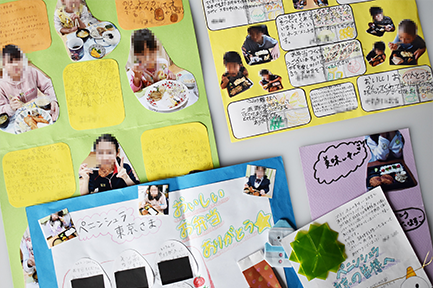
A Thank-you letter from the children
Photo provided by The Peninsula Tokyo
Photo provided by The Peninsula Tokyo
Our activities bring happiness to others
――
You have carried out various charity activities throughout the year in addition to “We Meet Again.” Please tell us about some characteristic activities.
Yamashita
Even before "We Meet Again," we've been implementing the "Onigiri Project" in collaboration with Hands On Tokyo for nearly 10 years. Twice a month, company volunteers gather to make onigiri (rice balls) and take them to people in need of food. The initiative is popular with our employees as an opportunity for interaction that exceeds departments and divisions, and each time many participate in the 30-minute onigiri making. We've also gotten letters of thanks from people who received the onigiri, so we feel that our actions bring happiness to others.
Moreover, every October a portion of earnings from endeavors such as a pink-themed afternoon tea set is donated to organizations including the Japan Association of Breast Cancer Screening as a Pink Ribbon campaign. During the Festive holiday season, some of the proceeds from afternoon tea and ornaments are given to the School Library Association. Many people who want to do something to help those in need, and we value offering opportunities that naturally lead to social contributions through meals and shopping.
In August 2020, we participated in the charity run, the "Great TOKYO Odyssey." The DMO Tokyo Marunouchi Office reached out to us, and when we asked for employees in our company to join, we got such a huge response that we had to cut down on the number of participants. Ultimately, about 20 employees ran in Marunouchi and Yurakucho, handing off the runner's sash to the next person to run the next section of the race. The MICE industry united in this endeavor to promote the city of Tokyo to the world. Plus, the participation fee was donated to a nonprofit organization, so there was no reason not to join. Our company hopes this kind of event continues going forward and wants to actively be involved.
Moreover, every October a portion of earnings from endeavors such as a pink-themed afternoon tea set is donated to organizations including the Japan Association of Breast Cancer Screening as a Pink Ribbon campaign. During the Festive holiday season, some of the proceeds from afternoon tea and ornaments are given to the School Library Association. Many people who want to do something to help those in need, and we value offering opportunities that naturally lead to social contributions through meals and shopping.
In August 2020, we participated in the charity run, the "Great TOKYO Odyssey." The DMO Tokyo Marunouchi Office reached out to us, and when we asked for employees in our company to join, we got such a huge response that we had to cut down on the number of participants. Ultimately, about 20 employees ran in Marunouchi and Yurakucho, handing off the runner's sash to the next person to run the next section of the race. The MICE industry united in this endeavor to promote the city of Tokyo to the world. Plus, the participation fee was donated to a nonprofit organization, so there was no reason not to join. Our company hopes this kind of event continues going forward and wants to actively be involved.
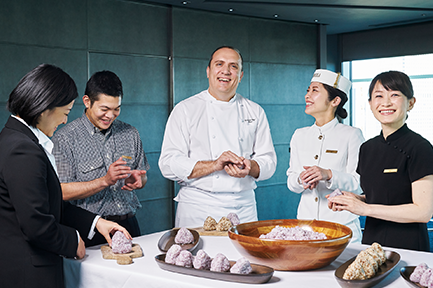
The Onigiri project
Photo provided by The Peninsula Tokyo
Photo provided by The Peninsula Tokyo
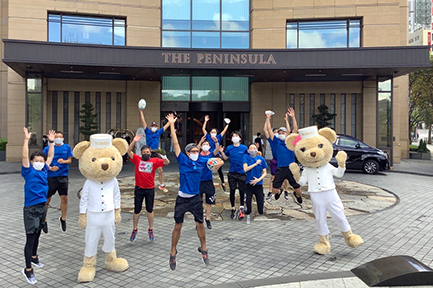
The Great TOKYO Odyssey
Photo provided by The Peninsula Tokyo
Photo provided by The Peninsula Tokyo
Aiming for sustainable hotel management together with the community
――
What initiatives do you intend to focus on in the future?
Yamashita
In 2021, the Group is looking ahead to 2030 and launching the "Sustainable Luxury Vision 2030" project. We're conscious of the SDGs, which have the same target year, and will make concerted efforts to heighten our activities. Maintaining the Gold EarthCheck Certification is also imperative. Obtaining this kind of certification is not a one-and-done deal, so our efforts are meaningless if they don't extend beyond acquisition. Our attitude is demonstrated by continuing to retain that high level over the long run.
Every year more and more of society checks whether companies are conducting business with sustainability in mind. That undercurrent is increasingly rising in the MICE industry. Our company was the first in Japan to obtain EarthCheck Certification early on, and we believe our strengths will become more and more advantageous going forward.
It's also important to contribute to the development of Marunouchi area through our SDG initiatives. If we work together with other companies in the same area, we can surely expand our company's solitary trickle of activities so that they become a river. Our hotels have various departments and a variety of experts, so I think the possibilities for collaboration in a wide range of areas will grow. While leveraging the ultimate asset, human resources, we hope to discover new positive courses of action.
Every year more and more of society checks whether companies are conducting business with sustainability in mind. That undercurrent is increasingly rising in the MICE industry. Our company was the first in Japan to obtain EarthCheck Certification early on, and we believe our strengths will become more and more advantageous going forward.
It's also important to contribute to the development of Marunouchi area through our SDG initiatives. If we work together with other companies in the same area, we can surely expand our company's solitary trickle of activities so that they become a river. Our hotels have various departments and a variety of experts, so I think the possibilities for collaboration in a wide range of areas will grow. While leveraging the ultimate asset, human resources, we hope to discover new positive courses of action.
